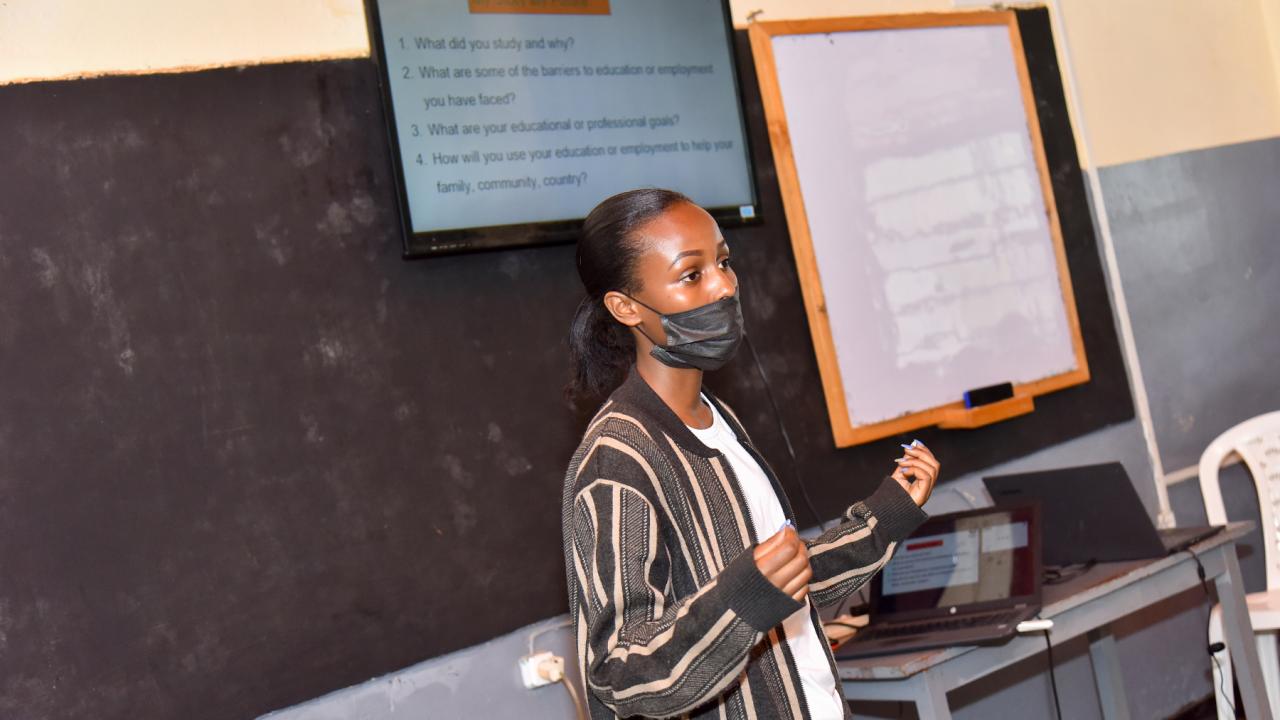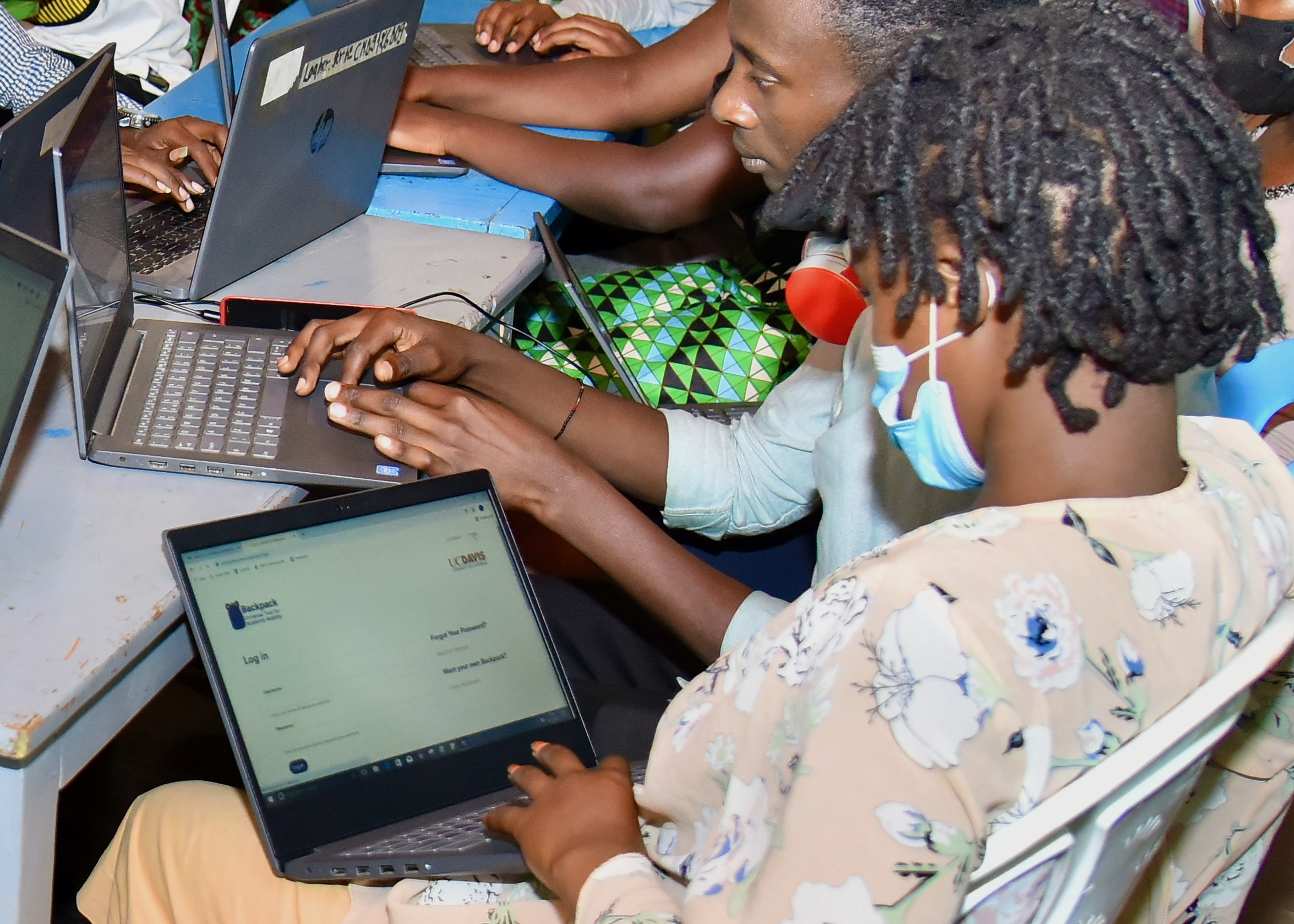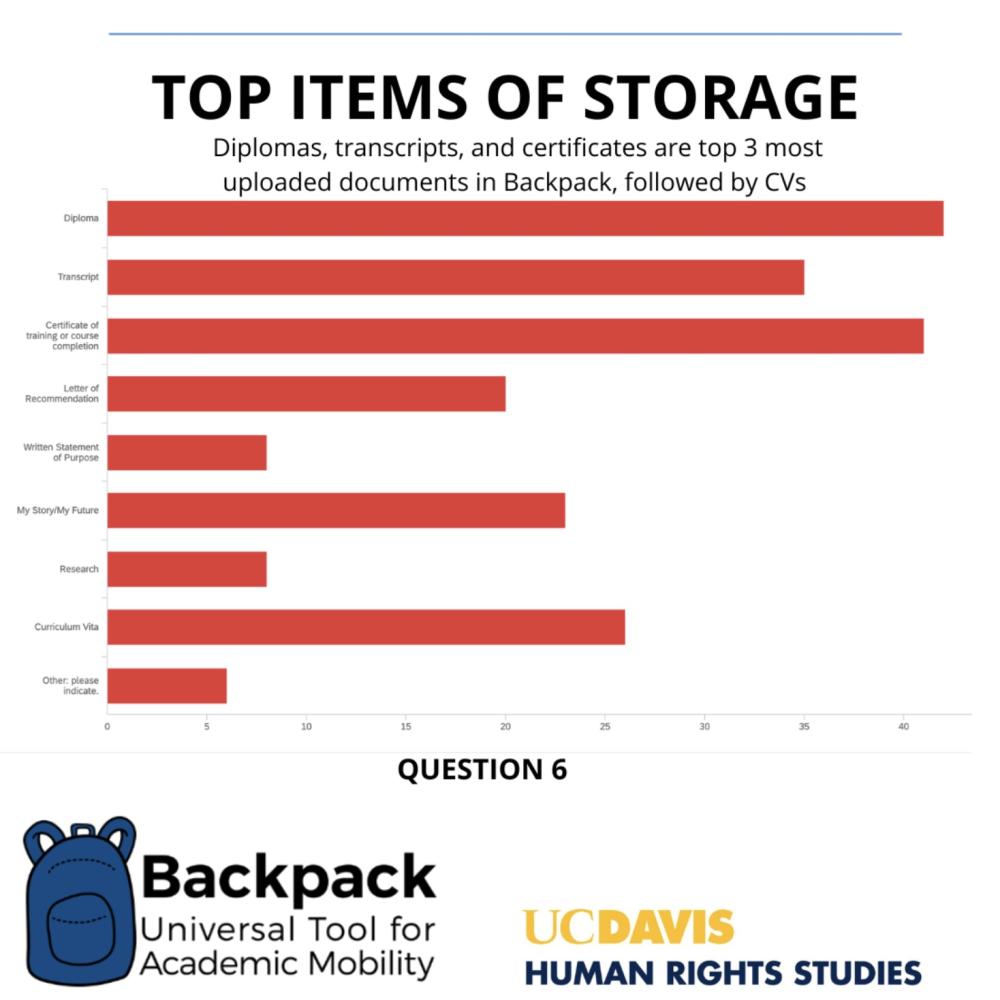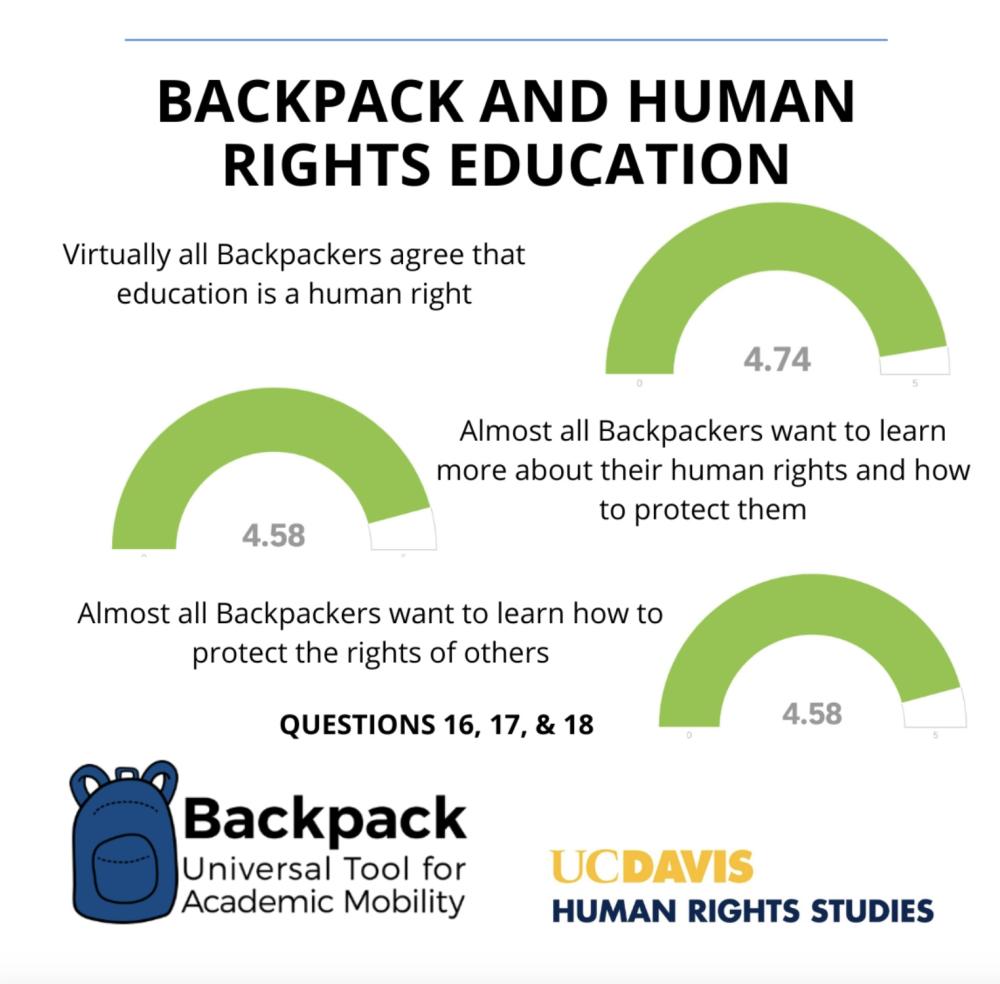
Securing Refugee Higher Education Futures and the Need to Close the Digital Divide in East Africa
A report on the joint UC Davis Human Rights Studies Program/Kepler Article 26 Backpack Refugee Academic Mobility and Human Rights Education Learning Project, Rwanda and Ethiopia 2021-2023
Quick Summary
- During 2021-2022, UC Davis Human Rights Studies faculty, staff, and students collaborated with Kepler to empower higher education access for over 2200 university-age refugee young people in Rwanda through the implementation of Article 26 Backpack.
- Document safety, education about the right to access one’s educational materials and knowledge of the human rights to privacy, education, and work can be part of all forms of scholarship support, workforce development, and leadership.
- Backpack is sustainable – it builds from populations of students who see value in the Backpack project and fits squarely into growing university-based and scholarship agency support for service and global learning opportunities.
- Refugees and other displaced people are often unaware of their human rights, including the human right to education. At the same time they are eager to learn about their human rights.
A Global Project Starts During a Pandemic
During 2021-2022, with the support of a MasterCard Foundation learning grant, UC Davis Human Rights Studies faculty, staff, and students collaborated with Kepler employees and student fellows to empower higher education access for over 2200 university-age refugee young people in Rwanda and Ethiopia through the implementation of the Article 26 Backpack higher educational mobility ecosystem (Backpack).
Backpack is a digital-human ecosystem that provides an opportunity for members of displaced, at-risk, and under-served communities to safely curate, store, and share critical academic materials, credentials, research, and statements of purpose. It is a unique ecosystem to address wide-spread concerns amongst humanitarian workers, human rights officials, higher education leaders, and refugees about document and credential safety, access, and sharing.
This is the largest implementation of the Article 26 Backpack thus far and has demonstrated the effectiveness of and scalability of the ecosystem.
The UC Davis Human Rights Lab has published a 30-page report based on that joint project and a global survey of Backpack users.
Among the most critical findings are:
- Young adult refugees are deeply concerned about the safety and security of their critical academic and employment credentials, documents, research, and creative works.
- The Article 26 Backpack Ecosystem can meet this need when combined with soft-skills training, information about scholarship opportunities, and human rights is an effective tool for improving outcomes for refugee higher education, workforce development, and leadership and empowerment projects.
- The collaboration provides a model for a cost-effective way to reach even larger numbers of people who would benefit from the ecosystem, support efforts by university and scholarship agencies to increase applications from refugee youth, and act as a critical adjunct to ongoing efforts to grow higher education and career counseling.
- Internet connectivity, digital literacy, and international language capacity remain key barriers to the effective use of all digital-based tools, including the Article 26 Backpack. A failure to address this gap will result in an ever-widening gulf between digital haves and have-nots in higher education.
Backpack Builds Pathways of Connection and Solidarity
Backpackers tell us that they believe that, once stored in Backpack, their documents are safe. They are aware that they can access these documents wherever and whenever they need to.
Beyond the numbers enrolled and the achievement of document and credential safety, Backpack continues to demonstrate its capacity to build pathways of connection and solidarity among diverse refugee communities and global higher education; provide leadership, training, and counseling opportunities for refugee youth; and expand knowledge of educational resources, admissions and scholarship opportunities, and human rights.
UNESCO/UNHCR: Secure Refugee Higher Education Documents
"Documents may be lost or stolen during migration and replacing…credentials is often impossible [or] a costly and lengthy process. Most countries do not acknowledge or recognize informally obtained credentials…HEIs [higher education institutes] often require refugee learners to repeat years of their education, which…can lead to exclusion, since students’ economic situation most likely does not permit them to repeat their education".
– Michaela, Martin and Manal Stulgatis, 2022) “Refugees' Access to Higher Education in Their Host Countries: Overcoming the 'Super-Disadvantage': Policy Paper.” UNESCO: IIEP, 12 May 2022
The collaboration provides a model for a cost-effective way to reach even larger numbers of people who would benefit from the ecosystem, support efforts by university and scholarship agencies to increase applications from refugee youth, and act as a critical adjunct to ongoing efforts to grow higher education and career counseling.
Operating Backpack and the structured and scheduled interaction between Backpack users and staff in Rwanda and California have provided an unprecedented window into the day-to-day struggles of refugee young people and their efforts to engage and re-engage in higher education. This “ground truth” can help shape policies and projects moving forward, particularly in areas of connection, high-stakes language and standardized exams, and credential evaluation.
Establishing Backpack in the Rwandan Context
Backpack is built on two interlocking parts.
The first is the digital element: Backpackers set up their Backpack accounts when helped by Backpack Guides. Backpackers can use any electronic device that is connected to the web and has a web browser. Setting up an account requires users to have an email account. Survey data indicates how valuable hands-on support by Guides in this process is; Kepler Rwanda indicated that, in many cases, this was the first time that eligible students had created email accounts and that it was an opportunity for quick soft-skills instruction and connection-building. Once an account is created, students often use the camera function on their cell phones or tablets to photograph documents and upload them.
The second part of Backpack is the community of Backpack Guides who ensure the integrity of the Backpack, grow awareness of the ecosystem, and work with youth to optimize the enrollment process. In person, remotely, and through social media, Guides educate Backpackers on the digital platform’s use, model educational attainment, and identify and share opportunities; they also support efforts to deepen human rights knowledge, in particular the human rights to education, work, and privacy. Throughout the project, teams in Rwanda and later in Ethiopia coordinated and led enrollment events. These took place in Kigali, Rwanda, and at multiple refugee camps and refugee high schools.

In general, Backpack Guides are near peers to the refugee youth using Backpack. They are drawn from students pursuing undergraduate degrees in Human Rights Studies at the University of California, Davis, university students on one hand, and on the other from refugee and displaced young people in host countries. Guides not only work to bring young people into Backpack, but their near-peer status and personal experiences make them ideal role models who can speak with authority and credibility about the value and challenges of higher education. The experience of Backpack Guiding and information from Backpackers themselves indicate how Backpack enrollment events or similar meetings could also serve as venues for college counseling sessions, to raise awareness of scholarship or enrollment opportunities, and/or for soft-skills training.
Gauging Backpack’s Effectiveness
In an interview conducted by UC Davis Guides (July 2022) Josephine Uwizeye, an Article 26 Backpack Project Fellow at Kepler, reported that prospective Backpackers at refugee camps in Rwanda were excited to learn more about Backpack and how they can engage or re-engage with their education. Kepler Fellows prepared for enrollment events by working with their partners at refugee camps and administrators at schools, sharing information via social media and through institutional partners (such as Rwanda’s emergency management ministry (MINEMA) and UNHCR), and utilizing volunteer support to advertise enrollment opportunities and to assist with the enrollment process. Enrollment groups were divided by educational level and used technology such as phones, tablets, laptops, routers, and projectors. While enrollment events and the registration process worked effectively, technological issues occasionally arose; there were insufficient tablets and laptops, a lack of power and 4G internet coverage in some locations, and a lack of basic technological skills, digital literacy, and training among youth.

She explained further that, in addition to uploading their school graduation reports, transcripts, IDs, CVs, and certificates to Backpack during enrollment events, Backpackers gained technological literacy that can be a valuable transferable skill for future experiences and opportunities. They are trained to use the digital storytelling and sharing features of Backpack.
Additionally, Backpackers are supported with resources following their enrollment, including Kepler opportunities, Coursera courses offered by UNHCR, free Duolingo English tests, and knowledge of enrollment opportunities with the African Leadership University. Backpackers are also briefed on their human right to education as established by the UNDHR and subsequent treaties and international norms.
From survey data and direct observation, we know that Backpackers are uploading critical materials into Backpack and that they have been using these materials primarily for admissions purposes, job seeking, and scholarship applications. Smaller numbers have used the ecosystem for official purposes, including asylum applications and residency permits.
Backpack Guides, including Uwizeye, report that these are often very exciting and fun events where young people feel free to interact with the Guides and each other; students report that the events are often helpful in helping them organize not just their documents, but also their short and longer-term plans. It can foster an internal dialog about future and goals. From the perspective of supporting refugee young people’s well-being and agency, these events serve as an act of solidarity, addressing directly the universal concern raised by refugees that they have been forgotten.
Backpack as Human Rights Education Tool
Backpack is a very important tool that is needed, not only to educate displaced individuals about human rights, but, also, to give them access to different educational and employment opportunities. The beneficiaries have a high level of interest in the use and exploitation of the platform, but there is a significant challenge that hinders its maximum utilization: connectivity.
– Jackson Byiringiro and Aimee Umulisa, Refugee College Guidance Counselors at Kepler
Broadening Backpack’s Reach - Answering Core Questions
The experience gained over the last months has also helped answer critical questions that had remained unanswered following the Backpack’s first implementation effort among Syrian refugees in Lebanon 2018-2019.
The first is the question of buy-in: a broad term that roughly translates into the willingness of local communities and refugee-facing higher education institutions and NGOs to adopt and continue to use Backpack in the absence of continued support from UC Davis. Our initial observation is that the Kepler team enthusiastically adopted Backpack, incorporating it into their practice and innovating and adapting it to their specific needs and conditions. Significant examples of this buy-in include the development of the Backpack Ambassadors program—a way to train young people in camp settings primarily to continue to introduce and help people use Backpack; the translation of Backpack training materials into Kinyarwanda, including the creation of an asynchronous education video; and efforts by Rwanda-based Backpack Guides to expand Backpack’s reach into Ethiopia alongside Kepler’s work in that country. Indeed, UC Davis Human Rights Studies has adopted the Backpack Ambassadors program more generally and will extend the opportunity to Backpackers outside of East Africa.
The second major question is scalability. A team of 17, including five in Rwanda and 12 at UC Davis, helped bring over 2200 new Backpackers into the ecosystem through enrollment events, social media outreach, online office hours, and similar activities across a 10 month period of time. We estimate that an additional 1000 will enroll by the end of the academic year (June, 2023). During this period, UC Davis has been able to keep pace with the support of the team in Rwanda — while also managing the project’s response to the crises in Afghanistan, Ukraine, and Iran and engaging in fundraising, digital platform maintenance, and security updates.
The model and ongoing assessment capabilities developed in Rwanda showcase how Backpack, with proper funding in place, can be scaled through the integrated use of fellowships, training, workshops, and peer-to-peer engagement. The additional enrolled Backpackers posed no issues to the Backpack’s digital hardware or software infrastructure. In fact, as numbers increase the per Backpacker, cost of hosting begins to lessen quickly.

The third question is sustainability; how can Backpack be sustained? UC Davis Human Rights Studies views Backpack as a public good, Backpackers as members of a community, and the growing global network of Guides and Ambassadors as colleagues. This forestalls building sustainability on charging Backpackers for the use of or access to materials stored in Backpack. Backpack is relatively cost-effective, in part because of its integration into the public engagement and career development opportunities associated with the UC Davis Human Rights Studies Program, which brings talented and multilingual university students into service and leadership roles and the commitment of faculty and staff time from the institution. In the field of operation, sustainability becomes a question of financial support to help refugee-facing educational NGOs integrate Backpack into standard practices. Our experience with the implementation in Rwanda is a guide to broader costs and benchmarks of achievement and probable outcomes.
Recommendations
UC Davis Human Rights Studies primary recommendation is to respond to calls from refugee and at-risk university-age populations to provide global support for their (re)engagement with higher education and workforce opportunities by ensuring the safety, security, and accessibility of their most vulnerable and critical educational documents and credentials. At the same time, efforts should be undertaken to build connections with refugee communities along pathways of solidarity and for policy advocacy, knowledge of human rights, and awareness of opportunity.
In this, we echo many of the recommendations in Martin and Stugaitis (2022) and further advise that in addition to supporting refugees' access through flexibility in the evaluation and the acceptance of credentials (Recommendation 9), a priority be placed on providing ways for refugees not to be dependent on state agencies or HEI’s for the safety, security, and accessibility of their documentation and, rather, facilitate opportunities like Backpack universally. This is an easily addressed way to reduce individual vulnerability to human rights abuse and aid efforts to promote civilian protection.
Put another way, key international efforts to facilitate the movement of refugees into higher education will continue to be plagued by problems of documentation unless and until the human right to possess and ability to store safely and access credentials and documents are readily available to all.
Higher education philanthropy and international and intergovernmental scholarship organizations (UNHCR, DAFI) are uniquely positioned to ensure this outcome. A simple measure this sector should take is to require any partner IHE to demonstrate that scholarship applicants and enrollees are provided an opportunity to store their academic materials upon application and upon graduation with Backpack, or a tool that provides similar secure, independent, and permanent control of their materials.
A similar requirement was recently stated in the CFP issued by USAID to support Burmese refugee university students: “The Contractor must assist HE students with secure technologies that allow them to securely store academic records, credentials, professional certificates, research, and other important documents. For example, Article 26 Backpack is an organization that has expressed interest in supporting such efforts for HE students in Burma” (U.S. Agency for International Development).
We further recommend that funding be provided to support multi-year joint outreach projects involving Kepler and UC Davis to expand Backpack’s coverage throughout Africa, leveraging the Tertiary Refugee Student Network. The effort would blend competitive grants to groups and institutions interested in integrating Backpack into their programs with fellowships to provide support to Backpack Guides. Because of Backpack’s multilingual capacity, these efforts should not be limited to only Anglophone environments but include French and Arabic - and if needed develop additional language capacity (ie Amharic).
Additional Recommendations
A key “ground truth” we have observed through our work with refugee young people is the prohibitive costs of required English language examinations, most notably the TOEFL exam. We encourage all HEI to waive that requirement or pay for the examinations of refugee students unless or until ITS makes the examination available for free or at little cost to refugees.
Alternatively, we encourage institutions to support the use of Duolingo, which has made, via Backpack, 200+ free exams available.
IHE should consider ways to integrate Backpack into scholarship or general admissions applications.
HRE should become a standard element of all refugee education and programs; refugee university students should be a special focus for this effort as they constitute the sector most likely to lead further efforts at human rights advocacy and defense and have a demonstrated interest in the subject.
Media Contact:
Natalia Stehlin - Article 26 Backpack Media Coordinator
Keith David Watenpaugh - Professor and Director UC Davis Human Rights Studies/Article 26 Backpack Project
(530) 574-0815